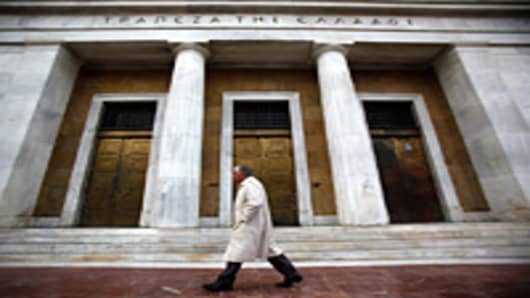As the bets that European banks made on United States mortgage investments went bust a few years ago, bankers piled into what they saw as a safe refuge: bonds issued by countries in Europe’s seemingly ironclad monetary union.
Now, the political and financial crisis engulfing the Continent has turned much of that European sovereign debt into the latest distressed asset, sending tremors through global financial markets not seen since the demise of the investment bank Lehman Brothers more than three years ago.
This week, shortly after European leaders formally conceded that Greece could not pay its debts and forced banks to accept losses, the shock waves reached Italy, the third-largest economy in the euro zone after France and Germany. And despite frantic efforts by politicians to contain the damage, market analysts said that France, one of the strongest countries in the euro zone, may soon feel the impact.
“When people started buying more European sovereign debt, there was not a cloud in the sky,” said Yannis Stournaras, director of the Foundation for Economic and Industrial Research, based in Athens. Now, he said, “This crisis is going to last because the perceptions of risk have changed dramatically.”
European banks face tens and possibly hundreds of billions of dollars in losses on loans to nations that use the euro. Worried about even greater losses if the crisis worsens, the banks have been scrambling to reduce their holdings of an investment that, like triple-A-rated subprime mortgage bonds, was once thought to be bulletproof.
The French bank Société Générale, for instance, this week marked down 333 million euros of its Greek sovereign debt holdings and in October slashed its exposure to that country to 575 million euros, from 2.4 billion euros at the beginning of 2011. Another French bank, BNP Paribas, has cut its holdings of Italian government debt 40 percent since July, to 12.2 billion euros.
How European sovereign debt became the new subprime is a story with many culprits, including governments that borrowed beyond their means, regulators who permitted banks to treat the bonds as risk-free and investors who for too long did not make much of a distinction between the bonds of troubled economies like Greece and Italy and those issued by the rock-solid Germany.
Banks had further incentive to overlook the perils of individual euro zone countries because of the fees they earned for underwriting sovereign debt sold to other investors. Since 2005, several dozen banks in Europe and the United States have earned $1.1 billion in fees from selling bonds for European governments, according to Thomson Reuters and Freeman Consulting Services.
Like other investors, banks clung for a long time to the seemingly inviolable belief that all the countries using the euro would make good on their debts. For years, Greek and Italian bonds did not pay much more than German ones, but banks were always hungry to chase even a fraction of additional profit. For much of the last decade, they bought the higher-yield bonds, ignoring the growing political and fiscal problems of those countries as well as other peripheral euro zone nations like Ireland, Spain and Portugal.
Regulators bear much of the responsibility. Before 1999, when Europe forged its monetary union, regulators permitted banks to treat as risk-free the debt of any country that belonged to the Organization for Economic Cooperation and Development, a club of developed nations that includes the United States and most of Europe.
“There was encouragement from European authorities for banks to load up on more debt, because it was seen as safe,” said Nicolas Véron, a senior fellow at Bruegel, a research firm in Brussels. “In hindsight, it was unwise risk management.”
Some regulators realized that allowing banks to set aside no capital for sovereign defaults could be a problem and moved to address it in a 2006 accord known as Basel 2. They mandated that big, complex banks use their own models to determine if individual countries were at risk and hold some capital against them. But the European Union never enforced the stiffer regime. And amid the subprime mortgage crisis, Europe’s regulators added to the problem by demanding that banks hold more safe assets, much of it sovereign debt.
As a result, banks were not discouraged from placing their most liquid assets “into the worst possible government debt,” Achim Kassow, a former Commerzbank board member, wrote in a study published by the European Parliament.


